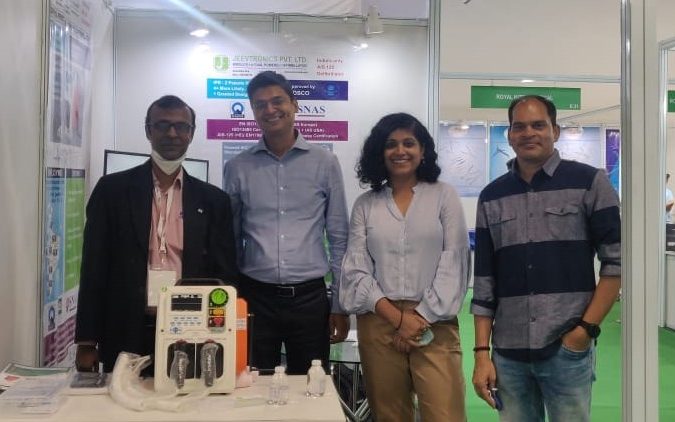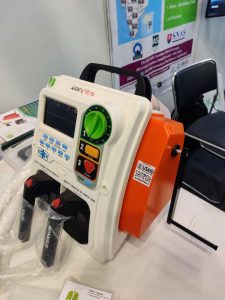Author: Team SAMRIDH

‘World class but affordable’ – that’s what Ashish Gawade and Aniruddha Atre, the founders of Jeevtronics Pvt. Ltd., had in mind when they entered the still nascent medical devices market. Today, they’re the proud creators of the world’s first dual-powered – and the only ambulance-certified – defibrillator in India.
While over 660,000 deaths occur in India due to sudden cardiac arrest, this risk considerably increased during the pandemic with 16.7% COVID-19 patients developing arrhythmias (irregular heartbeats). To deal with cardiac arrests and the situation of arrhythmias, a medical device called ‘Defibrillator’ helps to restore the normal heart rhythm by applying a high voltage shock across a patient’s heart.However, only one in 50 hospital beds in India have a defibrillator. This is owing to a lack of reliable electricity supply, affordability, poor quality refurbished devices, and the high cost of battery replacement required for defibrillators. Furthermore, India accounts for 11% of global deaths in road accidents, the highest in the world. Since accident trauma patients are more likely to go into a cardiac arrest, the presence of defibrillators in trauma ambulances is crucial. Yet, only advanced life support ambulances (about 25% of total ambulances) have defibrillators.
In this context, Jeevtronics developed the SanMitra 1000 HCT and the SanMitra 1000 HCT EMS Biphasic Defibrillator, a first-of-its-kind, low maintenance, cost-effective, lifesaving, hand-cranked defibrillator. The device can be charged from the AC mains within 6-7 seconds, which is twice as fast as multinational players’ brands and is priced at less than 25% of what they cost. The long lifespan, affordable costs, and ability to run without electricity make this device critical in allowing healthcare workers to provide quality emergency care to avoid preventable deaths, particularly in low-resource settings. Eighty percent of these devices are being supplied to tier II and III towns reaching the most vulnerable. In January 2021, the Jeevtronics team donated a Defibrillator to the COVID-19 ward at AIIMS Nagpur, which has proved to be useful for resuscitating patients during the pandemic.
Even beyond the pandemic, the device continues to save lives. At a government hospital in Raigad, Maharashtra, the SanMitra is used to provide emergency care to several sudden cardiac arrest patients, young and old, brought in critical condition – oftentimes due to serious road accidents on highways. For instance, a 19-year-old and a 25-year-old man, injured in road accidents, were brought to the hospital in a critical condition and were successfully revived using SanMitra 1000 HCT. “Using the defibrillator, we were able to resuscitate them”, says Dr. Amar C. Barat, the Medical Officer at the hospital, “as was the case with a 75-year-old male who was rushed to the casualty section in a state of cardiogenic shock and edema. In a government hospital setting in rural areas, where there’s sometimes no electricity or load shedding, the defibrillator is very useful. During an emergency at the hospital, the SanMitra Defibrillator is easy to transport, and it’s also easy to train the staff and interns on how to use it.”
SAMRIDH, supported by USAID and implemented by IPE Global, has enabled Jeevtronics to increase accessibility to this life-saving device across resource-constrained hospitals in semi-urban and rural regions of India. Through financial and business advisory support, SAMRIDH is providing Jeevtronics with the opportunity to increase their market presence and design a commercial strategy for building a steady pipeline of orders. This is further aiding them to secure affordable working capital loans to service the new order flow and build a business model for long-term sustainability and expansion to low-resourced hospitals. Bolstered by the support in distribution and sales, Jeevtronics estimates impacting the lives of 1.9 million people from low-income communities.

Not only has this contributed to the product advancement and sustainability of the SanMitra 1000 device, but it has also helped Jeevtronics expand its R&D activities which will help in rolling out newer products in this space, thus broadening the product portfolio. Jeevtronics is also working on product upgrades to increase benefits and overall cost savings for the end-user. To expand the installed base of defibrillators in hospitals and ambulances, Jeevtronics is also planning on building strategic partnerships with organizations who can assist in the rapid scale up of the innovation across India.
The journey of Jeevtronics is a clear example of how India is seeing a robust start-up ecosystem as enterprises come up with innovative solutions in the healthcare sector, especially with the COVID-19 pandemic unfolding. However, these enterprises often lack affordable capital and business advisory support to scale their solutions and reach out to vulnerable populations in hard-to-reach areas.
Initiatives such as USAID-supported SAMRIDH are leveraging innovative financing solutions such as blended finance to catalyze innovations in the healthcare sector. By driving capital into high-impact sectors while effectively leveraging private sector expertise to identify and execute developmental investment strategies, blended finance can fast-track India’s efforts to achieve the Sustainable Development Goals and improve the lives of vulnerable communities.

